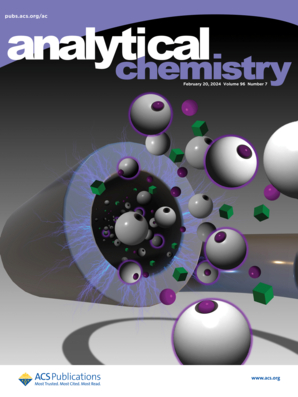A Flexible End-to-End Automated Sample Preparation Workflow Enables Standardized and Scalable Bottom-up Proteomics.
IF 6.7
1区 化学
Q1 CHEMISTRY, ANALYTICAL
引用次数: 0
Abstract
Bottom-up proteomics holds significant promise for clinical applications due to its high sensitivity and precision but is limited by labor-intensive, low-throughput sample preparation methods. Advanced automation is essential to enhance throughput, reproducibility, and accuracy and to allow standardization to make bottom-up proteomics amenable to large-scale studies. We developed a fully integrated, automated sample preparation platform that covers the entire process from biological sample input to mass-spectrometry-ready peptide output and can be applied to a multitude of biological samples. With this end-to-end solution, we achieved high intra- and interplate reproducibility, as well as longitudinal consistency, resulting in precise and reproducible workflows. We showed that our automated workflow surpasses established manual and semiautomated workflows, while improving time efficiency. Finally, we demonstrated the suitability of our automated sample preparation platform for drug development by performing high-content compound characterization for targeted protein degradation, where high throughput and quantitative accuracy are indispensable. For this, we coupled application-specific workflows to perform proteome profiling and confirm target degradation by precise protein quantification. Overall, our results highlight the selective degradation of specific proteins of interest for ten selected compounds across two cell lines. Thus, the automated sample preparation platform facilitates rapid adaptation to emerging developments in proteomics sample preparation, combining standardization, flexibility, and high-throughput capabilities to drive significant advancements in clinical assays and proteomics research.灵活的端到端自动化样品制备工作流程实现标准化和可扩展的自下而上蛋白质组学。
自下而上的蛋白质组学由于其高灵敏度和精密度,在临床应用中具有重要的前景,但受劳动密集型、低通量样品制备方法的限制。先进的自动化是必不可少的,以提高吞吐量,可重复性和准确性,并允许标准化,使自下而上的蛋白质组学适合大规模的研究。我们开发了一个完全集成的自动化样品制备平台,涵盖了从生物样品输入到质谱准备的肽输出的整个过程,可以应用于多种生物样品。通过这种端到端解决方案,我们实现了高的板内和板间再现性,以及纵向一致性,从而实现了精确和可再现的工作流程。我们展示了我们的自动化工作流程超越了已建立的手动和半自动化工作流程,同时提高了时间效率。最后,我们通过对靶向蛋白质降解进行高含量化合物表征,证明了我们的自动化样品制备平台在药物开发中的适用性,其中高通量和定量准确性是必不可少的。为此,我们结合了特定应用程序的工作流程来执行蛋白质组分析,并通过精确的蛋白质量化来确认目标降解。总的来说,我们的结果强调了两种细胞系中10种选定化合物的特定蛋白质的选择性降解。因此,自动化样品制备平台有助于快速适应蛋白质组学样品制备的新兴发展,结合标准化,灵活性和高通量能力,推动临床分析和蛋白质组学研究的重大进步。
本文章由计算机程序翻译,如有差异,请以英文原文为准。
求助全文
约1分钟内获得全文
求助全文
来源期刊

Analytical Chemistry
化学-分析化学
CiteScore
12.10
自引率
12.20%
发文量
1949
审稿时长
1.4 months
期刊介绍:
Analytical Chemistry, a peer-reviewed research journal, focuses on disseminating new and original knowledge across all branches of analytical chemistry. Fundamental articles may explore general principles of chemical measurement science and need not directly address existing or potential analytical methodology. They can be entirely theoretical or report experimental results. Contributions may cover various phases of analytical operations, including sampling, bioanalysis, electrochemistry, mass spectrometry, microscale and nanoscale systems, environmental analysis, separations, spectroscopy, chemical reactions and selectivity, instrumentation, imaging, surface analysis, and data processing. Papers discussing known analytical methods should present a significant, original application of the method, a notable improvement, or results on an important analyte.
 求助内容:
求助内容: 应助结果提醒方式:
应助结果提醒方式:


